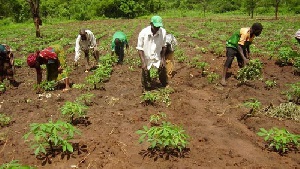 Farmers in Ghana are being celebrated today for their contributions to growth in the country
Farmers in Ghana are being celebrated today for their contributions to growth in the country
It is a common political language that agriculture is the backbone of the Ghanaian economy. And therefore, just as a human being cannot live without the backbone, there could be no meaningful development in Ghana without agriculture. It is against this backdrop that the government of Ghana has instituted a national holiday in honour of our hardworking farmers and fishermen.
Thus, on the first Friday of December every year, selected farmers and fishermen across the country are given various awards ranging from farming inputs to vehicles and houses. Again, during the occasion, promises upon promises are made as regards how the agricultural sector could be improved for our betterment.
The question then is: how far have our farmers fared in this country, as far as their welfare and farming activities are concerned? Surprisingly, whilst almost all the wealthy people in advanced countries like the United Kingdom and United States are farmers, the opposite is the case in developing countries such as Ghana. Again, whilst only 3-5% of the population in advanced countries is involved in agriculture, over 60% of the Ghanaian population is involved in agriculture.
The irony however is that, the 5% farmers in the UK are able to feed the 60 million UK population and offer the surplus for sale. Interestingly, the land for agriculture in these advanced countries, apart from not being fertile like ours, is also limited in supply. There is also plenty of arable land that lie waste in Ghana with a sizeable number of unemployed youth who could till the land on the street. In view of this, Ghana is still a net-importer of food, thus affecting the country's balance of payments negatively.
In spite of the efforts being made by the government to improve the agricultural sector, food crops continue to rot and the post-harvest losses alone can feed another country of 20m people. In a nutshell, the major problems facing agriculture, that is, poor road network, land tenure system, bad weather conditions, financial constraints, lack of mechanisation, etc, have been with us since time immemorial.
Although, there has been a number of sector ministers in charge of agriculture over the years, and there are many agricultural institutions in Ghana, it seems the solution to the above-mentioned problems have eluded them. My question is; why can't the nation solve at least one single problem of agriculture for once? For, any attempt to give a priority attention to agriculture amd education, is the surest way to addressing poverty among the citizenry.
Everybody would agree with me that our farmers deserve better than the lip service being paid to them on yearly basis. But, I am so excited that, the NPP government under His Excellency, Nana Akufo-Addo is walking the talk now. Affordable loans and improved seedlings are being given to farmers; silos are being built to avoid post-harvest losses and roads are being constructed in the hinterlands to ensure that, the food get to the marketing centres. Again, agriculture is being mechanised through the government policy of "Planting for Food and Jobs" as well as "One Village, One Dam". It is hoped that, the government would institute producer prices for other agriculture products like yam, tomatoes, plantain, etc whilst we add value to these agricultural products in order to feed the citizenry well and get more from the exports.
In this way, Ghana could move from a net-importer of food to a net-exporter of food. This would strengthen the country's balance of payments through foreign exchange earnings, reduce unemployment rate, and increase productivity. The industrial sector, which is gradually picking up through the government's policy of " One District, One Factory" could also benefit from the raw materials from the agricultural sector because of the backward and forward linkages between the two sectors.
As a cocoa farmer, I would like all my well-wishers to join me in saying "Ayekoo" to all Ghanaian farmers on this great occasion.
God bless Ghana! God bless Ghanaian farmers!!